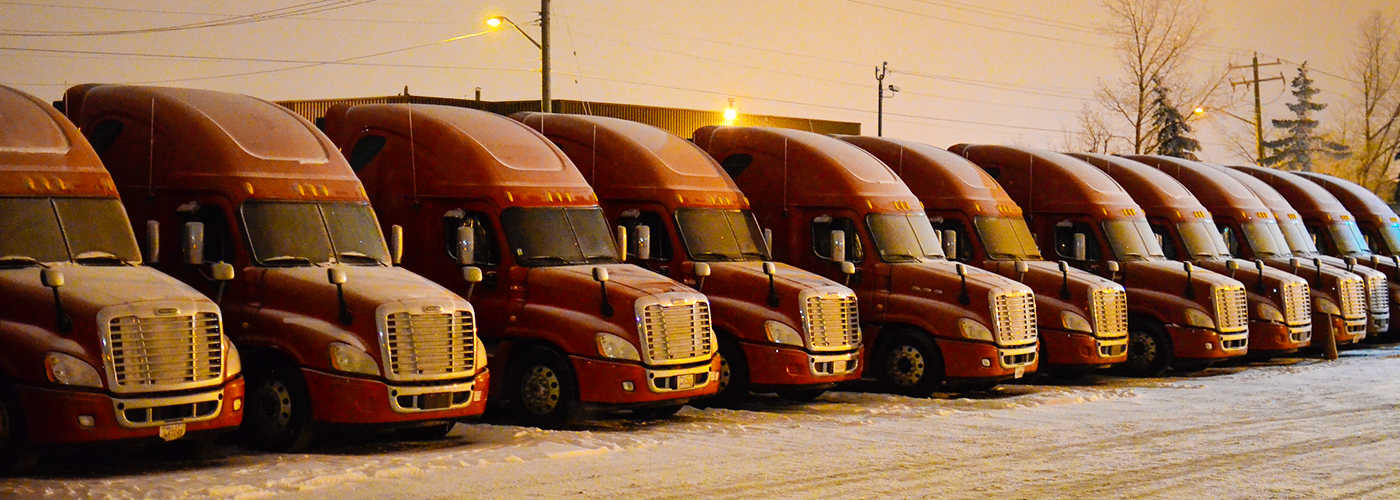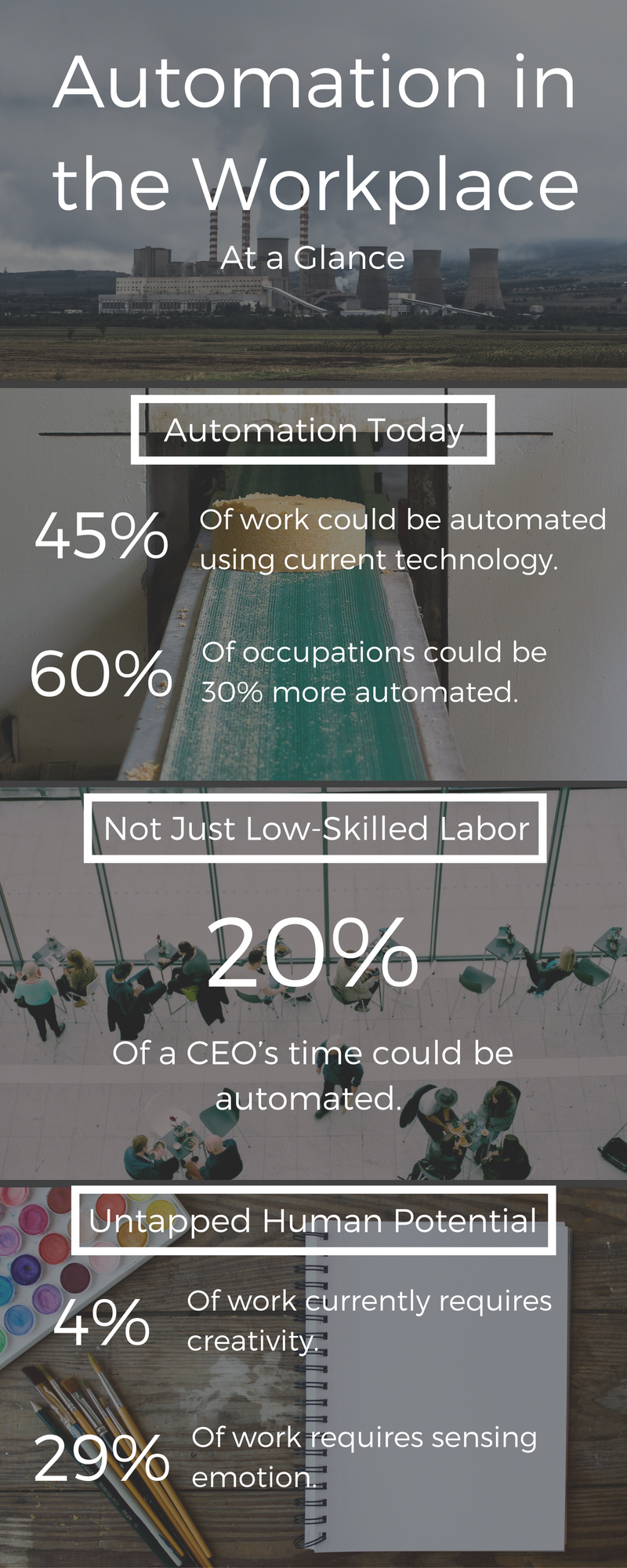Last month, Budweiser delivered 50,000 beers via its very first self-driving truck. This recent example of automation was met with a divisive reaction, adding fuel to the debate of job insecurity and what a future of automation and artificial intelligence means for us.
On one hand, integrating self-driving trucks means putting 3.5 million truck drivers out of a job. On the other, self-driving cars could significantly reduce the rate of car accidents – the leading cause of death in the U.S. Regardless of one’s stance on the issue, it’s undeniable that automation means a cataclysmic shift for humanity.
Self-driving trucks means putting 3.5 million truck drivers out of a job. Tweet This Quote
During the Unreasonable Impact program, which focuses on job creation within the green economy, discussing the future of jobs was inevitable. As a way of opening up a discourse around the topic, mentors and specialists at the program shared their thoughts on what automation means for job creation.
JEFF HOFFMAN
Co-Founder of Priceline.com, Emmy Award Winning Producer, and “CEO Hall of Famer.”
I think while the technology kills the jobs we don’t want, it creates this opening to find new ways to deploy people that we’ve never thought of before. And I think that’s an exciting opportunity. We have so many human issues that we can’t deal with, and those aren’t jobs today. I think there’s all kinds of redeployment that’s good for the human race when we think it through.
TY TASHIRO
Social scientist and author of The Science of Happily Ever After.
On a policy level, we need to have good foresight and a really holistic plan. One of the ideas I’ve heard is a basic income that’s assured, which allows people to pursue vocations or interests or something they’re
passionate about, instead of the job they were doing that’s now been automated.
On a policy level, we need to have good foresight and a really holistic plan. Tweet This Quote
Obviously, automation could go really badly if we don’t have good foresight, but I think if we do, there’s a lot of opportunities to unlock people’s potential and allow them to do the things that they actually want to do in life.
TOM CHI
Former Lead of the team at Google X that created Google Glass and the self-driving car.
I would say that jobs as they are is not necessarily your benchmark because intrinsically, the nature of jobs will change. The initial computers were actually human beings that were just really good at math and would compute stuff by hand. That as a job no longer exists, but people with analytic skills moved on to be accountants and actuaries and data scientists.
Is there a world where all manufacturing is done by machines, including fine detail work? Absolutely. Is there a world where transportation and logistics will be fully automated? Absolutely. But the way that I look at it is we’re chasing down these high value things, we’re eventually getting to the point where the basics like food, clothing, and shelter go into automation and will become incredibly cheap.
GEORGE KEMBEL
Co-Founder of the Stanford d.school, entrepreneur and venture capitalist.
Job creation and the employment rate increasingly sound to me like industrial era metrics – that we’re measuring the health of our economy based on employment. And I think we’re moving past the idea that the job is the measure of economic health.
I think we’re moving past the idea that the job is the measure of economic health. Tweet This Quote
We’re starting to see more of a pioneering spirit of blazing the trail that you want in your life and creating the economics to support the life that you want. That’s the backdrop in which I would answer that question. If I hear automation in the wrong jobs, that sounds scary, like automation is going to kill jobs. But if you put it against this other canvas of jobs no longer being the metric, but people finding their own means, then technology is a radical enabler.
CHERYL HELLER
Serial entrepreneur, founder of the MFA Design for Social Innovation at SVA, founder of the design lab CommonWise.
I think job creation and automation can’t be looked at in the same way around the world. There are countries that are so far from people having livelihoods or jobs, the last thing anybody needs to worry about is automation.
So for the people that are working in the United States, for the people who are in other countries where jobs have been lost to automation, I think that it’s a bigger problem that society has to solve as a whole. And I also think there are examples of organizations like Ecovative in New York with its plastic replacement grown from mushrooms that are creating new industries and new ways of thinking about industry. And I think it’s a different kind of invention in developed countries than it is in developing countries. It’s a really place-based issue.
HUNTER LOVINS
Founder of Natural Capitalism Solutions, author of Natural Capitalism, Millennium TIME Hero of the Planet.
More fundamentally, the issue is about who owns the machines. Who owns this intelligence? It is a form of capital, and increasingly in our economy, capital is what begets capital. So we need to rethink capitalism. This is particularly acute in the area of who owns the intelligence, who owns automation, because if it’s going to put us all out of work, then we need to get out ahead of it and have a discussion on how do we distribute the benefits of this automation.
More fundamentally, the issue is about who owns the machines. Who owns this intelligence? Tweet This Quote
Jobs are more than just the way in which the world defines you by your paycheck. It defines you whether you’re white-collar or blue-collar, but it is your purpose. For many people, it is more of a purpose than your family. It’s where you spend most of your time. In a day, it’s who you are. And so we’re going to have to rethink everything from our economic structures to how we make a living to who we are. All of this kicked off by a couple of robots.
PASCAL FINETTE
Serial tech entrepreneur, Managing Director of Singularity University Labs, coach and speaker.
I think it’s a multifaceted problem. I believe that there will be job loss due to automation. Some people call this technology unemployment. The classic example is self-driving cars, eliminating the need for drivers. Those jobs will probably be gone. I think it’s a little shortsighted for two reasons.
I believe that automation leading to lower costs, leading to more abundantly available services, goods, etc. will actually create a situation where more and more of our living needs are more and more accessible to everyone.
The other side is what history has shown us again and again, that when one type of job disappears, it typically gets replaced with something else. When you think about the industrial age where a lot of craftsmen’s jobs went away, nobody really knew what the new types of jobs would be.
GRACE KIM
Managing Director at GOODcorps
My thoughts on automation and technology and what it means for job creation would begin with a reminder of what it means to be human and how to remember humans in our society and what they mean for business.
It comes down to the question of how do we treat humans as humans and not as commodities Tweet This Quote
When decisions are made purely for production and yield with no regard for human life, and careers have been built within the company for years because of being part of the production line, it begs the question of who’s paying attention for the people.
For me it comes down to the question of how do we treat humans as humans and not as commodities who happen to be able to generate extra profit for a company.




